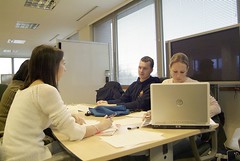 My friend, Nancy Willard (Center for Safe and Responsible Internet Use), shares, via the ever present WWWEDU, a new report from American Psychologist, a journal of the American Psychological Association. The report, Online ‘Predators’ and Their Victims: Myths, Realities and Implications for Prevention, is based on a study involving three surveys conducted in 2000 and 2005, including Internet users from age 10 to 17, and federal, state, and local law enforcement officials.
My friend, Nancy Willard (Center for Safe and Responsible Internet Use), shares, via the ever present WWWEDU, a new report from American Psychologist, a journal of the American Psychological Association. The report, Online ‘Predators’ and Their Victims: Myths, Realities and Implications for Prevention, is based on a study involving three surveys conducted in 2000 and 2005, including Internet users from age 10 to 17, and federal, state, and local law enforcement officials.
For an APA press release, Janis Wolak, the lead author of the student, said,
“To prevent these crimes, we need accurate information about their true dynamics.”
“The things that we hear and fear and the things that actually occur may not be the same. The newness of the environment makes it hard to see where the danger is.”
As an example,
..in spite of public concern, the authors found that adolescents’ use of popular social networking sites such as MySpace and Facebook do not appear to increase their risk of being victimized by online predators. Rather, it is risky online interactions such as talking online about sex to unknown people that increases vulnerability, according to the researchers.
Among the findings, according to the 18 February APA press release:
- Internet offenders pretended to be teenagers in only 5 percent of the crimes studied by researchers.
- Nearly 75 percent of victims who met offenders face-to-face did so more than once.
- Online sex offenders are seldom violent, and cases involving stalking or abduction are very rare.
- Youth who engaged in four or more risky online behaviors were much more likely to report receiving online sexual solicitations. The online risky behaviors included maintaining buddy lists that included strangers, discussing sex online with people they did not know in person and being rude or nasty online.
- Boys who are gay or are questioning their sexuality may be more susceptible to Internet-initiated sex crimes than other populations. Researchers found boys were the victims in nearly one-quarter of criminal cases, and most cases included facts that suggested victims were gay or questioning their sexuality.
You can download a PDF of the original AP article here.
Willard, Nancy. “Finally, great research insight on online predators.” E-mail to WWEDU Mailing List.19 Feb 2008.
Mills, Kim. “‘INTERNET PREDATOR’ STEREOTYPES DEBUNKED IN NEW STUDY.” APA Online. 18 Feb 2008. American Psychological Assocation. 21 Feb 2008 <http://www.apa.org/releases/sexoffender0208.html>.
Image Citation:
Carmichal, Alex. “The Future.” Roujo’s Photostream. 31 Oct 2007. 21 Feb 2008 <http://flickr.com/photos/tekmagika/1811656015/>.


 Often, when I’m talking about how our information environment is changing, I describe my experiences with
Often, when I’m talking about how our information environment is changing, I describe my experiences with  A while back, I opened a staff development institute for a school district someplace in New England. I delivered my contemporary literacy thing where I uncover Nazi conspiracies, built maps of the world with tabular data, construct historic tag clouds, and showcase amazingly inspiring student video productions. It’s a great magic and I confess some thrill in performing it. I’m old enough to remember when it would have been magic.
A while back, I opened a staff development institute for a school district someplace in New England. I delivered my contemporary literacy thing where I uncover Nazi conspiracies, built maps of the world with tabular data, construct historic tag clouds, and showcase amazingly inspiring student video productions. It’s a great magic and I confess some thrill in performing it. I’m old enough to remember when it would have been magic. Here is a introduction to a report I received by e-mail this morning. The web version is available at the
Here is a introduction to a report I received by e-mail this morning. The web version is available at the  Even more foreign to education as we know it, is a product that I took a tour of yesterday, thanks to Shmuly Tennenhaus. I don’t think I’ve been so intrigued, excited, or felt my old-fashioned senses so threatened in years as what I saw in their product, GlobalScholar. The company features three offerings, starting with a web-based learning management system. Currently providing their bread and butter, the LMS will soon serve 800,000 students in South Carolina.
Even more foreign to education as we know it, is a product that I took a tour of yesterday, thanks to Shmuly Tennenhaus. I don’t think I’ve been so intrigued, excited, or felt my old-fashioned senses so threatened in years as what I saw in their product, GlobalScholar. The company features three offerings, starting with a web-based learning management system. Currently providing their bread and butter, the LMS will soon serve 800,000 students in South Carolina. ETAN
ETAN Last week, a teacher came up to me and asked what she should do to develop the 21st century skills I was talking about. But it’s a hard thing to explain in two minutes off the top of my head — and it’s not the first time we’ve heard that question. It would be nice if I could point them to an online course that I’m managing or some other billable offering. But that’s simply not what I do — nor can I say, “Buy my book!“
Last week, a teacher came up to me and asked what she should do to develop the 21st century skills I was talking about. But it’s a hard thing to explain in two minutes off the top of my head — and it’s not the first time we’ve heard that question. It would be nice if I could point them to an online course that I’m managing or some other billable offering. But that’s simply not what I do — nor can I say, “Buy my book!“